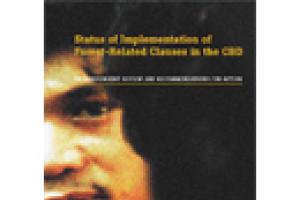The Mapuche People in Chile have been struggling against national and transnational forestry companies and against the State to recover their lands for years now. The encroachment of monoculture tree plantations in the VIII, IX and X Regions, where the Mapuche population is over 337,000 inhabitants, has involved Mapuche territorial ethnocide. The scarcity of land and the cultural and environmental destruction in the ecosystem of communities neighbouring the plantations, has made many of them rise up in self-defence.
Chile
Bulletin articles
7 November 2002
Other information
7 October 2002
In Chile, 25 years of implementation of the neo-liberal economy model have had a strong impact on native forests and indigenous and local communities in the South. Over two million hectares of pine and eucalyptus plantations feed a large cellulose industry, geared for export. Over this period, hundreds of thousands hectares of native forests were converted into monoculture tree plantations. An accelerated concentration of land ownership, aided by State subsidies to plantations has led to serious territorial conflicts with the Mapuche indigenous communities, still continuing today.
Bulletin articles
12 July 2002
Hidden in the midst of remote mountains on the South Pacific coast of Chile, is the last remnant of intact coastal forest, one of the most diverse ecosystems of Latin America. It is estimated that one third of the temperate forests existing in the world are to be found in the Southern zone of Chile and Argentina. The Chilean temperate forest, protected from the glaciers by the Coastal Cordillera, is the remnant of what was once the widespread Valdivia forest.
Bulletin articles
15 April 2002
The systematic loss of Mapuche territory, that covered some 11 million hectares on the Chilean side (not including the historic territory of the Mapuche nation that stretched over an important part of the Argentinean side), as a result of the military invasion by the Chilean State that began in 1883, represents the starting point of the violent plundering of the Mapuche lands, with the loss of nearly 95% of their total territory.
Other information
18 March 2002
Commissioned by the Global Forest Coalition
This report is based on 21 country case studies, including Australia, Brazil, Cameroon, Canada, Chile, Colombia, Czech republic, Ghana, India, Indonesia, Kenya,Malaysia, the Netherlands, New Zealand/Aotearoa, Papua New Guinea, Russia, South Africa, Suriname, Uganda, United Kingdom, and Uruguay
Bulletin articles
15 March 2002
The Mapuche Coordination of Arauco-Malleco Communities in Conflict denounced that the large scale fires that burnt down some 53,000 hectares of native forests in the south of Chile last February, creating what was defined as an “environmental tragedy,” were caused intentionally by the sectors and bodies linked to the major forestry companies.
Bulletin articles
20 February 2002
The Chilean forestry model, based on the promotion of large-scale monocultures of pine trees and eucalyptus for export, has been implemented at the expense of the environment and of the local peoples. In spite of this fact, both the State and the forestry companies continue to hide the truth and insist that they are “planting forests” and contributing to the country’s development.
Bulletin articles
27 November 2001
Throughout the world, tree plantations and the installation of pulp mills are promoted by governments using, among others, the argument that these activities generate employment. However the true situation shows how false this argument is.
Bulletin articles
11 September 2001
The Chilean forestry model is known in Latin America because of its use of frontline technology in large scale pine and eucalyptus plantations, the rapid growth of wood-related exports and State subsidies for the promotion of plantations. Little is said of the social and environmental impacts of these fast growing plantations.
Bulletin articles
12 July 2001
A few days ago, serious events took place in the city of Temuco, ending in over 125 community members in jail, many injured and serious destruction. These incidents are the result of a long chain of encroachments that the Mapuche people have suffered throughout the whole of the twentieth century and that have not been recognised either publicly or fundamentally by the State, which continues to act in favour of forestry companies, providing them with all kinds of support, among which, placing the police force at the companies’ service.
Bulletin articles
12 April 2001
The fragmentation of habitats resulting from human activities --among which industrial tree plantations-- provokes restrictions in the supply of resources and the spacial needs of animal and plant species, which can even lead to the extinction of entire ecosystems. Once landscape structure has been altered the persistence of both plant and animal populations is menaced.
Bulletin articles
13 January 2001
The Biobío River springs from Icalma and Galletue lakes in the Andes, in southern Chile and flows during 380 km through forests, agricultural lands and cities to the Pacific Ocean, draining a watershed of 24,260 km2. Over one million people use the resources of the Biobío for drinking and irrigation water, recreation, and fisheries.

